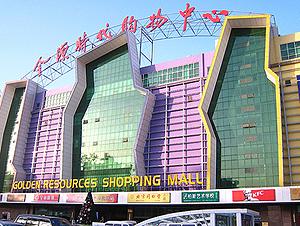Doubts about Asia’s economic rise
Beijing shopping mall. (Image: Flickr user star5112 (cc: by-nc-sa))
The following is not a full transcript; for full story, listen to audio.
A recent "Newsweek" article claimed, "While the West slumps, China’s economy has quickly sprung to life." Other articles are also pointing to a power shift from the West to the East.
Think again, said Minxin Pei on "Here and Now."
Pei is a senior associate at the Carnegie Endowment for International Peace, professor of government, and director of the Keck Center for International and Strategic Studies at Claremont McKenna College.
Per person, the U.S. is nearly 10 times richer than Asia; even at today’s heady growth rates, it would take the average Asian worker 77 years to reach the income of today’s average American.
"Asia’s growing fast, but at the same time Asia’s growing from a relatively low base," said Pei. "So if you look at per capita income, for Asia today it is roughly $5,000; for the US it’s almost $50,000."
And while there’s a high savings rate in Asia, that’s not always a good indicator, "If you have excessively high savings rates, then you have a problem because its shows that people have to save in order for an uncertain future. In the case of China, people save because they don’t have social safety nets. For instance, they don’t have adequate health insurance, they don’t have pension plans — that actually means a relatively weak social institutional structure … which means also that their average living standard is depressed because of the fear to consume."
According to Pei, the lack of big ideas is another road block for Asia’s economy. These big ideas, said Pei are Western ideas (like liberalism and markets) that organize the world today, "The most basic ideas that define the international orders today, such as the United Nations, multilateralism, international liberalism, human rights and so-called international public goods — all these ideas originated from the West … the very idea of capitalism and free market economy originated from the West."
Tied to this is innovation and Pei said, "Asian students are among the most hard working, talented and overachieving people we’ve seen. But at the same time we find this paradox: how come, Asia with so much native talent, has not been at the cutting edge of innovation?"
He uses Sony as an example of this lack of innovation, "Fifteen years ago, Sony was feared to be taking over the US … and today if you look at Sony, it’s a struggling company — it cannot compete with Apple … that has a lot to do with the cultural differences between Asia and the US. The US encourages independent thinking, critical thinking — which means that you always challenge your authorities, and you try to unseat the reigning authority — in terms of ideas and technology. In Asia, there is this excessive deference and respect for authority — the culture there is much more hierarchical."
Pei recently wrote an article on this topic for "Foreign Policy" magazine — read it here.
"Here and Now" is an essential midday news magazine for those who want the latest news and expanded conversation on today’s hot-button topics: public affairs, foreign policy, science and technology, the arts and more.
Every day, reporters and producers at The World are hard at work bringing you human-centered news from across the globe. But we can’t do it without you. We need your support to ensure we can continue this work for another year.
Make a gift today, and you’ll help us unlock a matching gift of $67,000!
